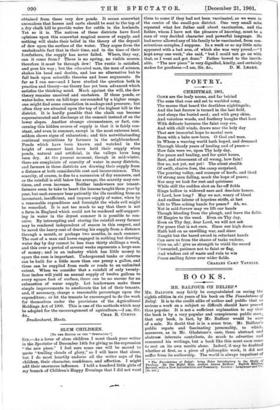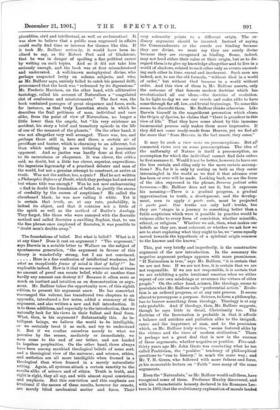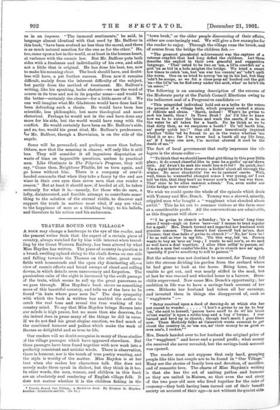BOOKS.
MR. BALFOUR ON BELIEF.*
Mn. BALFOUR may fairly be congratulated on seeing the eighth edition in six years of his book on The Foundations of Belief. It is to the credit alike of author and public that so serious a work on a subject so difficult should have proved thus popular. It is not a sufficient explanation to say that the book is by a very popular and conspicuous public man ; that any book, in fact, by Mr. Balfour would be sure of a sale. No doubt that is in a sense true. Mr. Balfour's public repute and fascinating personality, to which, moreover, as in Mr. Gladstone's ease, these abstract and abstruse interests contribute, do much to advertise and commend his writings, but a book like this must soon come to rest on its own merits alone. Indeed, it may be doubted whether at first, as a piece of philosophic work, it did not suffer from its authorship. The world is always impatient of • The Foundations of Belief: being Notes Introductory to the Study of Theology. By the Right Hon. Arthur James Balfour. Eighth Edition, Revised, with a New Introduction and Summary. London : Bohemians and Co. [6s. net.] • pluralities, civil and intellectual, as well as ecclesiastical. It was slow to believe that a public man engrossed in affairs could really find time or interest for themes like this. If it took Mr. Balfour seriouzly, it would have been in- clined to say, as Sir Robert Peel said of Gladstone, that he was in danger of spoiling a fine political career by writing on such topics. And so it did not take him seriously enough, and the book was at first misunderstood and underrated. A well-known metaphysical divine, who perhaps suspected levity on solemn subjects, and who, as Mr. Balfour says, entirely failed to catch his general drift, pronounced that the book was "redeemed by its digressions." Mr. Frederic Harrison, on the other hand, with alliterative tautology, called his account of Naturalism a "coagulated clot of confusions and misstatements." The fact was, the book contained passages of great eloquence and force, such, for instance, as that truly Lucretian strain in which he -describes the frail pettiness of man, individual and race alike, from the point of view of Naturalism, no longer a little lower than the angels, but "his very existence an accident, his story a brief and transitory episode in the life of one of the meanest of the planets." On the other hand, it was not altogether very well arranged. There was, too, and perhaps there still is, here and there, a certain air of persiflage and banter, which is charming to an adherent. but than which nothing is more irritating to a passionate opponent. And so justice was hardly done at first either -to its earnestness or eloquence. It was clever, the critics said, no doubt, but a little too clever, superior, supercilious, the ingenious logomaehy of a practised debater and man of the world, but not a genuine attempt to construct, or arrive at truth. Was not the author, too, a cynic ? Had he not written a Philosophic Defence of Doubt, which they perhaps had not read but whose title was enough ? Was he not now endeavouring o find in doubt the foundation of belief, to justify the excess of credulity by the excess of scepticism ? He called the chessboard black, he was now calling it white. Yet it is certain that truth, or, at any rate, probability, is indeed its object, and that it contains not a little of the spirit as well as the method of Butler's Analogy. They forgot, like those who were annoyed with the Socratic method and called Socrates a cavilling Sophist, that, to use the fine phrase once employed of Socrates, it was possible to "doubt men's doubts away."
The foundations of belief. But what is belief? What is it at any time P Does it rest on argument ? "The argument," says Darwin in a notable letter to Wallace on the subject of spontaneous generation, "the argument in favour of this theory is wonderfully strong, but I am not convinced.
Here is a fine confession of intellectual weakness, but what an inexplicable frame of mind is that of belief?" In- explicable indeed. How is it that we are conscious that at times no amount of proof can create belief, while at another time hardly any amount can destroy it ? Because it often rests as much on instinct and intuition as on demonstration or argu- ment. Mr. Balfour takes the opportunity now, of this eighth edition, to present his argument anew. He has somewhat rearranged the volume, has transferred two chapters to an appendix, introduced a few notes, added a summary of the argument, and also written a new and full introduction. It is to these additions, and especially to the introduction, that we naturally look for his views in their fullest and final form. What, then, is his argument ? Substantially this. As in- telligent beings, we believe the world to .be intelligible, or we certainly treat it as such, and try to understand it. But if we confine ourselves merely to what we perceive by the senses, mediately or immediately, we soon come to the end of our tether, and are landed in hopeless perplexities. On the other hand, there always have been among mankind theological beliefs of some sort, and a theological view of the universe ; and science, ethics, and esthetics are all more intelligible when framed in a theological than when framed in a merely naturalistic setting. Again, all systems attach a certain sanctity to the results alike of science and of ethics. Truth is truth, and right is right, they all say, and with almost equal conviction and emphasis. But this conviction and this emphasis are irrational if the causes of these . results, however far remote, are merely blind mechanical matter and. force. Their very solemnity points to a different origin. The or- dinary argument should be inverted. Instead of saying the Commandments or the creeds are binding because they are divine, we must say they are surely divine because they are recognised as binding. Some, indeed, may not heed either their value or their origin, but so to dis- regard them is to give up knowledge altogether and to live in a world of shadows, related to each other only as events succeed- ing each other in time, casual and incoherent. Such men are indeed, not, to use the old formula, "without God in a world of order," but without God because in a world without order. And this view of them is, Mr. Balfour asserts, only the outcome of that famous modern doctrine which has revolutionised all our ideas,—the doctrine of evolution. In its light to-day we see our creeds and codes alike to have come through far off, low, and brutal beginnings. To some this seems to discredit them. Mr. Balfour thinks otherwise. Like Darwin himself in the magnificent peroration which closes the Origin of Species, he claims that "there is grandeur in this view of life." That they have come about by this immense immemorial process only makes them more impressive. If they did not come ready-made from Heaven, yet we feel all the more that "from Heaven, in the last resort, they came."
It may be such a view rests on preconceptions. But all connected views rest on some preconceptions. The idea of the uniformity of Nature is itself a preconception, an assumption for which the individual cannot find data unless he first assumes it. Would it not. be better, however, to leave out the less certain and cling only to the more certain assump- tions? No, for it is only by resting on both as they occur intermingled in the world as we find it that advance ever has been or ever will be made. Looking back, we see the force of the idea expressed in the phrase, Sectirus judicat orbis terrarum.—Mr. Balfour does not use it, but it expresses his meaning.—There is a gradual progress, a gradual approximation to truth, a development, and the develop- ment, seen to apply a pane ante, must be projected parts post. Our truths are only half - truths, but they are "stages in a journey to something better than a futile scepticism which were it possible in practice would be ruinous alike to every form of conviction, whether scientific, ethical, or religious." Whether we ask, then, what makes our beliefs as they are, most coherent, or whether we ask how we are to start exploring what they ought to be, we "seem equally moved towards the hypothesis of a spiritual origin common to the knower and the known."
This, put very briefly and imperfectly, is the constructive argument of the new introduction. In the summary the negative argument perhaps appears with more prominence. "If Naturalism is true," says Mr. Balfour, "it is certain that we are not free. If we are not free, it is certain that we are not responsible. If we are not responsible, it is certain that we are exhibiting a quite irrational emotion when we either repent of our own misdoings or reverence the virtues of other people." On the other hand, science, like theology, seems to postulate what Mr. Balfour calls "preferential action." Evolu- tion is an ordered progress, or at any rate process. It seems almost to presuppose a purpose. Science, to form a philosophy, has to borrow something from theology. Theology is at any rate probable. And if theology, then, Mr. Balfour suggests, though he says little in detail, Christianity too. The doctrine of the Incarnation is probable in that it affords a balance and antidote and palliation alike to the insignifi- cance and the impotence of man, and to the pessimism which, as Mr. Balfour truly writes, "seems fostered alike by the virtues and the vices of modern civilisation." There is perhaps not a great deal that is new in the essence of these arguments, whether negative or positive. Five-and- thirty years ago Mr. John Grote was combating what he too called Positivism, the " positive " tendency of philosophical questions to "run to history," in much the same way ; and Mr. T. H. Green, who followed with more fulness and force, in his memorable lecture on " Faith " uses many of the same arguments. "
Even the "Naturalists," as Mr. Balfour would call them, have recognised some of them. Professor Huxley discovered, and with his characteristic honesty declared in his Romanes Lec- ture in 1893, that the evolutionary explanation of morals landed as in an impasse. "The immoral sentiments," he said, in language almost identical with that used by Mr. Balfour in this book, "have been evolved no less than the moral, and there is as much natural sanction for the one as for the other." He, too, came upon a law in the world, or at least in the human heart, at variance with the cosmic law. But Mr. Balfour puts both sides with a freshness and individuality of his own, and adds not a little that is original. He has done his best, too, now to make his meaning clear. The book should have, and doubt- less will have, a yet further success. Even now it remains difficult, mainly from the inherent difficulty of the subject, but partly from the method of treatment. Mr. Balfour's writing, like his speaking, lacks rhetoric—we use the word of course in its true and not in its popular sense—and would be the better—certainly the clearer—for a little more of it. We can well imagine what Mr. Gladstone would have done had he been defending such a thesis. He would have been less scientific, less philosophic, but more theological and more rhetorical. Perhaps he would not in the end have done any more for his side, but the world would have rung with the conflict. He would certainly have been on Mr. Balfour's side, and so, too, would his great rival, Mr. Balfour's predecessor, for Mr. Balfour, though a Darwinian, is on the side of the angels.
Some will be persuaded, and perhaps more than before. Others, now that the meaning is clearer, will only like it still less. They will consider it all ingenious disputation or waste of time on impossible questions, useless to practical men. Like Obstinate in The Pilgrim's Progress, they will say, "Come then. Neighbour Pliable, let us turn again, and go home without him. There is a company of craz'd- headed coxcombs that when they take a fancy by the end are wiser in their own eyes than seven men that can render a reason." But at least it should now, if heeded at all, be taken seriously for what it is,—namely, for those who do care, a lofty, disinterested, and forcible attempt to contribute some- thing to the solution of the eternal riddle, to discover and support the truth in matters most. vital, if any are vital, to the happiness of man as a thinking being; to his beliefs, and therefore to his action and his endurance.












































 Previous page
Previous page